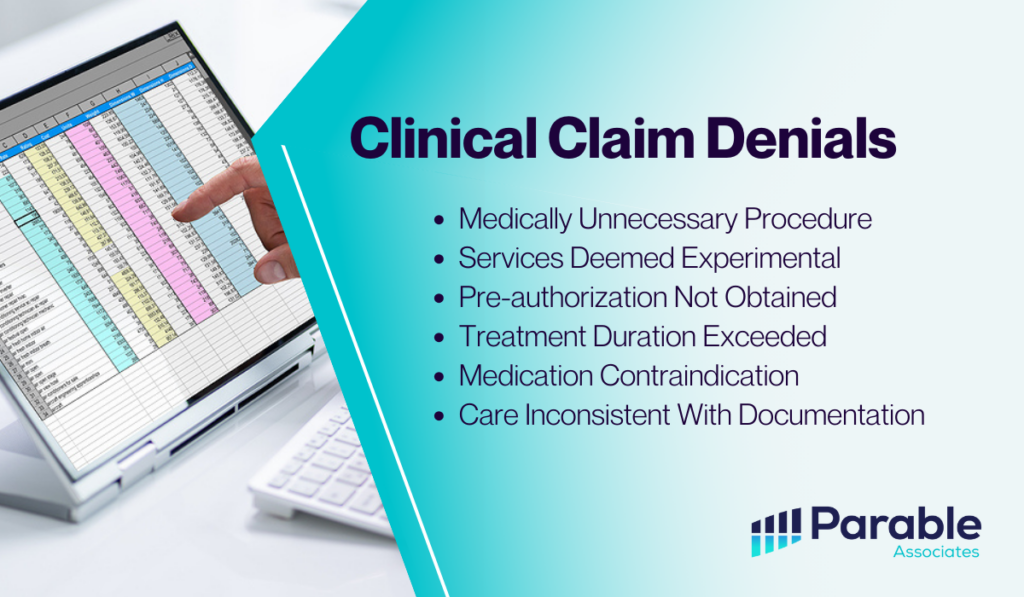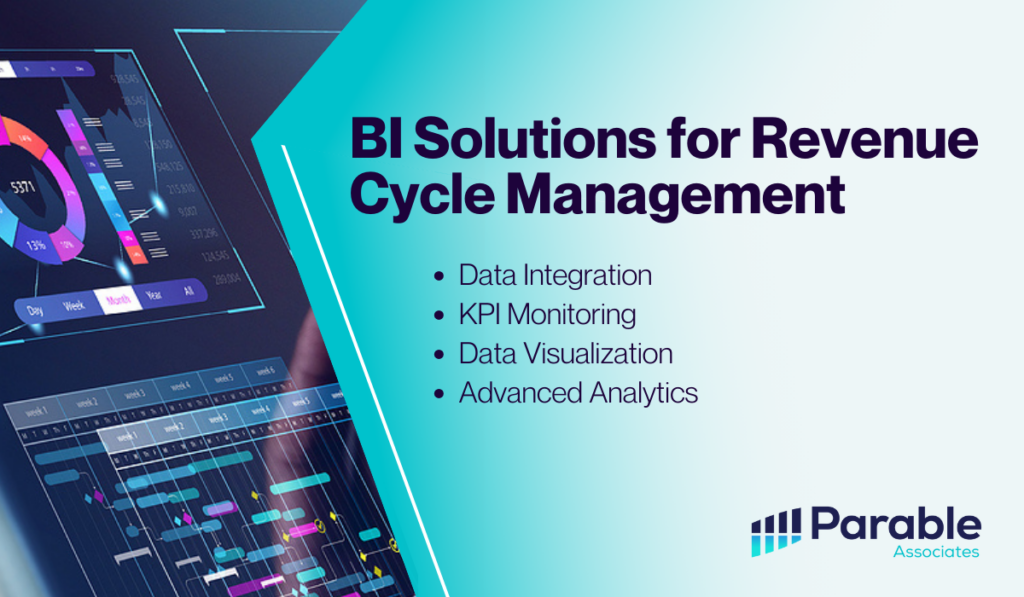Healthcare revenue cycle management (RCM) encompasses the entire process, from patient registration and appointment scheduling to claim payment, significantly influencing a practice’s financial well-being. Healthcare RCM involves various functions like patient access, health information management, charge capture, claims management, payment processing, and accounts receivable. Each function has key performance indicators (KPIs) contributing to overall revenue realization.
Practices face numerous challenges in RCM, leading to revenue leakage and decreased financial performance. Claim denials are one of the most significant contributors when discussing these challenges.
A denial refers to rejecting a submitted claim by an insurance payer. It occurs when an insurance company refuses reimbursement for services already provided and billed to a healthcare organization. Claim denials are typically either clinical or technical.

Clinical Denials
Clinical denials are reimbursement rejections that question the medical necessity or appropriateness of treatments delivered based on payer policy guidelines. These often stem from non-adherence to protocols regarding required authorizations, documentation criteria, care level justification, etc. By analyzing historical denial patterns and the protocols violated, practices can proactively manage compliance and minimize medical necessity claim rejections and associated revenue loss.
Medically Unnecessary Procedure
- The claim is denied because the link between the patient’s diagnosis and treatment is unclear or missing in the claim documentation.
- Example: Knee surgery is billed when the patient documentation shows conservative treatment was not tried first.
Services Demeed Experimental
- New or emerging treatments lacking conclusive evidence may be labeled experimental by payers.
- Example: Genetic testing is denied since efficacy is still being researched.
Appropriate Pre-authorization Not Obtained
- Payers require approval before delivering certain high-cost services
- Example: MRI approved for ankle but performed on knee instead
Treatment Duration Exceeded
- Payers have rules on the maximum number of allowed visits by type, such as physical therapy.
- Example: Only 60 PT sessions are allowed, but the provider bills for 70 sessions.
Care Inconsistent With Documentation
- A mismatch exists between the complexity of coded services and the documented medical necessity.
- Example: The claim shows specialist consultation, but the need needs to be clarified from the patient’s condition.
Prescribed Medication Is Contraindicated
- The treatment conflicts with other health conditions the patient has.
- Example: The prescribed drug that interacts negatively with another existing prescription.

Technical Denials
Unlike clinical denials, which question the medical necessity of billed services, technical denials result from administrative gaps in workflows or claims submission processes. These oversight errors lead to otherwise valid reimbursement claims getting rejected on factors unrelated to patient care – inaccurate codes, missing information, untimely filing, invalid documentation, and more. While easier to rectify than clinical denials, recurring technical rejections still significantly impact cash flow and revenue leakage. Identifying and plugging process gaps through denial root cause analysis is critical to improving realization rates.
Inaccurate Patient Information
Correct patient demographics, insurance details, contact information, etc., often lead to claims being denied. Common issues include:
- Claims were rejected because of errors in the member ID, group number, plan codes, etc. This requires additional follow-up and resubmission resulting in more aged AR.
- Eligibility checks are done too early, and patient coverage has changed by the time of service. Claims get denied when details don’t match insurance records.
- Invalid or outdated patient information prevents insurance verification and pre-authorization. Services rendered may not qualify for reimbursement.
Duplicate Medical Records
Patients registered more than once in practice management systems create duplicate records. This causes delays such as:
- The front desk needs help locating correct patient records during appointment scheduling or registration. Duplicate records need to be merged before visits.
- Clinical and billing data entered against the wrong record delays charge capture and claim generation.
- Payments may get posted to incorrect accounts causing statements to show incorrect balances.
Charge Capture Issues
Gaps in charge capture processes lead to revenue leakage:
- Outdated workflows where clinical documentation and coding are required before billing codes are assigned cause claim submission delays.
- Disjointed systems used by physicians, labs, pharmacies, etc., make it challenging to track all billable services for consolidated claim generation, and some services need to be included.
- Issues during interfacing data from ancillary systems and practice management solutions result in missing or rejected charges impacting reimbursement.
Denial Management
Insufficient denial management processes lead to high denial rates and revenue write-offs:
- Failure to appeal denials, resubmit claims, and follow-up stagnates accounts receivable, and the root cause of denials is neglected.
- Inconsistent review of denial reasons prevents the identification of recurring issues (e.g., authorization, bundling, invalid codes, etc.) that require workflow changes to fix systemic gaps.
Long Payment Posting Cycle
Delays in payment posting negatively impact cash flow:
- The unavailability of ERA/EFT (electronic remittance advice/electronic funds transfer) data prevents matching payments to open patient balances. Payments get posted late or to incorrect accounts.
- Manual payment posting leads to data entry errors resulting in misapplied payments and statements showing incorrect balances leading to more patient inquiries.

BI Solutions Healthcare for Revenue Cycle Management
Business intelligence (BI) platforms and data analytics can address revenue cycle challenges through data-driven insights to drive process improvements and optimize financial results. BI enables real-time visibility into performance issues by integrating information across clinical, financial, and operational systems onto a single analytics platform. Advanced analytics and intelligent reporting then allow targeted interventions to plug gaps related to patient access, denied claims, charge capture leakage, or delays in payment reconciliation. Look at some BI capabilities healthcare organizations can leverage to overcome revenue cycle inefficiencies.
Data Integration
Integrating data from disparate source systems provides a single source of truth for revenue cycle analysis instead of reviewing data in silos. Patient access, clinical, billing, and other systems can be unified on a BI platform. This is key for streamlined data analysis and allows the creation of a Revenue Cycle Data Mart on the BI platform by:
- Building customized ETL (extract, transform, load) routines to pull normalized data from source practice management, EHR (electronic health records), patient portal, and other transactional systems into BI data models
- Setting up automated scheduled data extracts to enable real-time data availability
- Establishing master data management for uniform identifiers, value mapping, metadata documentation, etc.
- Applying robust data governance protocols for data security, privacy, and access
KPI Monitoring
Key performance indicators allow you to monitor the health of revenue cycle processes. Dashboards track metrics like clean claims rate, AR days, denial rates, charge lag KPIs, etc. Alerts notify you when KPIs fall out of expected ranges. Capabilities include:
- Displaying KPI cards with color indicators for goal-tracking
- Building department-specific scorecards aligned to KPI targets
- Enabling drill-down from high-level metrics to underlying data elements
- Setting alert rules and notifications for metric deviations
Data Visualization
Interactive data visualizations provide insights into revenue cycle data. These dynamic visualizations empower practice management to conduct in-depth analysis of revenue cycle metrics, trends, and reports and provide:
- Interactive charts allow you to pan, zoom, filter, and drill down into charts for root cause analysis
- Visual cues like color coding, shaping, and sizing guide users toward insights from large data sets
- The ability to create your analysis views instead of getting standard reports delivered by IT
Advanced Analytics
Statistical models, machine learning algorithms, and predictive analytics support data-driven decisions for revenue cycle management:
- No-show predictive models assess past attendance patterns and other determinants that flag high-risk patients
- Denial predictors help model the likelihood of different denial reasons based on historical patterns
- Reimbursement forecasting engines estimate payer-wise collection rates according to contracted fee schedules
- Anomaly detection algorithms monitor claim submissions, payments, etc. to detect outliers indicating potential abuse

Supercharge Revenue Cycle Management with Healthcare BI
There is no denying that healthcare revenue cycle management plays a crucial role in the financial health of your practice. However, the processes are complex, with data and workflows spanning clinical, operational, and financial domains.
Healthcare BI solutions enable data connectivity, advanced analytics, and actionable insights to drive targeted enhancements. This creates a foundation for increased RCM efficiency, allowing healthcare providers to adopt data-driven decision-making. The results are sustainable gains in margin and profitability to fuel growth investments.
Many practices may need more in-house resources to implement BI effectively. However, when choosing a BI agency, it’s crucial to select one specializing in healthcare and understand its unique challenges.
That agency is Parable Associates.
Our team combines their expertise in healthcare with advanced analytical skills, utilizing state-of-the-art technology such as Power BI and Tableau to address complex healthcare challenges, identify opportunities for operational improvements, optimize your revenue cycle, and support the success of your healthcare practice. Our extensive experience in healthcare BI solutions and technology includes working with some of the top names in the industry – Experity, ModMed, and WebPT.
Contact us today to discuss how our tailored solutions can impact your organization. Parable Associates is the perfect business intelligence, implementation consulting, and training partner. Contact us and book a discovery call today!
Healthcare Revenue Cycle Management FAQs
Healthcare RCM is the process that manages the financial transactions from patient registration and appointment scheduling to claim payment. It includes patient access, health information management, charge capture, claims management, payment processing, and accounts receivable.
Claim denials, which occur when an insurance payer rejects a submitted claim, are a significant challenge in RCM. They lead to revenue leakage and decreased financial performance, impacting the financial health of your practice.
Clinical denials are rejections based on the medical necessity or appropriateness of treatments. They can be managed by adhering to payer policy guidelines, obtaining proper authorizations, ensuring accurate documentation, and analyzing historical denial patterns.
Technical denials result from administrative errors in the claims submission process, such as inaccurate patient information, untimely filing, invalid documentation, and other oversight errors.
Practices can reduce technical denials by ensuring accurate patient information, timely claims submission, proper documentation, and regular audits to identify and rectify process gaps.
BI solutions in RCM provide data-driven insights for process improvements and optimize financial results by integrating data across clinical, financial, and operational systems for real-time performance monitoring and targeted interventions..
Key features include data integration for a unified view, KPI monitoring for performance tracking, interactive data visualizations for in-depth analysis, and advanced analytics for predictive modeling and decision-making.
When choosing a BI agency, healthcare practices should look for agencies specializing in healthcare that understand the industry’s unique challenges and have a proven track record with relevant technology and solutions.
Yes, Parable Associates specializes in healthcare BI, combining expertise in healthcare and advanced analytics to address healthcare challenges, optimize the revenue cycle, and support the success of healthcare practices.
Healthcare practices can contact Parable Associates by visiting their website for a discovery call. They offer tailored solutions in BI implementation, consulting, and training, catering to the specific needs of healthcare practices.

